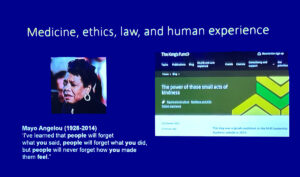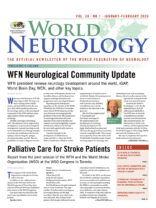Report from the joint session of the WFN and the World Stroke Organization (WSO) at the WSO Congress in Toronto.
 By Wolfgang Grisold
By Wolfgang Grisold
The Congress of the World Stroke Organization took place in October 2023 in Toronto.
In addition to the traditional joint session of the WFN and WSO at the World Congresses of Neurology, since 2022 the WSO and WFN have established joint sessions at the WSO Congresses.
Last year’s topic was education; this year’s topic was palliative care in stroke patients.
Speakers were:
Chairs:
- Kiechl (Austria)/Grisold(Austria)
Speakers:
- Gillian Mead (UK)
- Stefan Kiechl (Austria)
- Wolfgang Grisold (Austria): WFN.
- David Oliver (UK).
Prof. Kiechl presented epidemiological data on stroke worldwide. The large number of strokes as the most frequent neurological disease and the high mortality within five years after stroke were discussed. The Austrian stroke system, which is quite elaborate from the acute phase toward rehabilitation, was explained, and the role of palliative care discussed.
On behalf of the WFN, we discussed the worldwide availability of guidelines and recommendations for palliative care in stroke, as well as principles including the WHO recommendations and the ethical principles of autonomy, benefice, non-maleficence, and justice (Jansen 2022). A comparison with other palliative paradigms is important (Steigleder, Kollmar, and Ostgathe 2019) and for several neurological disease entities different concepts are needed.
For acute strokes, several guidelines and and recommendations exist (example: Braun et al. 2016), however little information exists on the palliative situations in stroke survivors, who have a high risk of recurrence as well as a high morbidity within five years. Stroke often leaves patients with impairment and disability (Wijeratne et al. 2023).
Following the hospital phase, often pain, sensory disturbances , sleep pathology, weakness, and sarcopenia appear. Loss of independence, existential worries, and often stigma with disability follow. Mental symptoms such as depression, apathy, also anxiety, agitation, and delirious states may occur (Cowey et al. 2021). (See Table 1.) Depending on the strategic localization of stroke, also neuro- cognitive sequelae of various nuances can be observed (examples: Anton’s syndrome, Capgras syndrome, among others).
Table 1
Mental changes in patients with stroke
During acute treatment:
- Mental changes
- Anxiety 12%-18%
- Delirium 8%-19%
- Agitation
After hospital discharge:
- Depression
- Neuropsychological changes
- Existential needs
- Hopelessness
- Loss of meaning
- Hopelessness
- From: Int J Stroke. 2021 Aug; 16(6): 632-639.
Published online 2021 May 17. do: 10.1177/17474930211016603 (Mod)
The ability of communication can be compromised by several factors. (See Table 2.)
Suicidal tendencies in stroke patients are rarely mentioned and have been described in mainly small studies (Paolucci and Ngeh 2015), (Paolucci and Ngeh 2015) and in few general reviews. (Vyas et al. 2021).
Particular attention should be paid to the fact that increasing frailty impairs the compensation of the entire organ system and leads to a global decline in performance “Seneca effect”. (Bardi 2017). Stroke is one cause of the collapse of complex, poorly compensated biological systems in older and often multimorbid and frail patients.
It is worth noting that data from nursing home patients on chronic stroke treatment, therapies, and rehabilitation are largely lacking (Cowman et al. 2010), and this is a gap between acute stroke treatment and the long term follow-up.
The next session was given by Prof. Gilian Mead (UK) and highlighted the role of the family in the course of the disease and in decision-making processes (Visvanathan et al. 2020). Ethical principles such as autonomy, doing good, doing no harm, and justice are the principles, as well as basic principles of palliative care in neurological diseases (Kluger et al. 2023).
An important aspect is the patient’s mental capacity, which determines the decision-making process: the ability to understand information, to critically analyze its content in terms of discussion or reflection, and finally to make decisions. The role of the family in patients who cannot express an opinion is important and requires many considerations. The literature has not yet addressed this issue in sufficient detail. Concepts for information about the disease, symptoms, and measures such as “tailored talks” with detailed and understandable templates for patients and relatives are useful. The concept of shared decision making involves the doctor, patient, and family (or partner) making further decisions together (Armstrong 2017) (Prick et al. 2022). Important aspects are unrealistic expectations about prognosis, outcome, and prognostication, both on the part of the patient/family and the clinician.
Table 2
Factors that frequently impair communication.
- Fatigue and loss of tenacity: depression, apathy, irritability
- Impairment of expression: facial expressions speech, tonality, prosody
- Loss of body image: neglect, disfiguration
- Loss of function, such as motor and coordination
- Social aspects: communication, isolation, incontinence,
- Stigma
From: Neurological Ddisorders With a Significant Psychiatric Disturbance, Grisold, W. and Grisold, S., Lecture: World Congress of Psychiatry (WPA) , September 2023, Vienna.
The effects of severe strokes on the further quality of life are often underestimated. This might cause an enormous impact on future lifestyle. (Fig.1)
In addition, cultural differences must be taken into account, and the effects caused by the stroke must be considered. Immediately after the stroke, there are important challenges for the family, which often needs support.

Slide shown by Prof. Mead at the WSO session in Toronto (reproduced with permission). Prof. Mead quoted Maya Angelou.
Prof. DJ Oliver (UK) spoke about the meaning of “end of life” and expected death. In contrast to many other neurological conditions, the changes occur suddenly, often without warning, and are accompanied by major changes in lifestyle. For the family, the catastrophic changes are compounded by uncertainty about future developments, such as the possibility of regression of the neurological deficit. The sometimes-unjustified hope of improvement through neuro-rehabilitation needs to be explained and discussed, and the expectation needs to be realistic.
In all cases, appropriate symptomatic treatment is important. Particularly in acute cases, there are unstable and complex situations that require complex decisions. Mental and psychosocial aspects also need to be considered.
However, preferences and priorities for desired future treatment require intact mental capacity.
In the joint discussion, the importance of the patient and family coming to terms with the stroke was discussed. There are undoubtedly more recommendations for the acute stroke phase than for the chronic phase, with the factor of permanent or increasing disability also having to be considered. Studies of nursing home patients show that there is a strong need to consider special measures for institutionalized patients with a history of stroke.
A further focus of investigation and research should be dedicated to stroke survivors who are prone to recurrence in the following five years, have a high comorbidity, and a high mortality rate. Especially for patients with disabilities and institutionalized patients, the aspects of palliative care need to be considered. •
Wolfgang Grisold is president of the WFN.
References
Armstrong, M. J. 2017. Shared decision-making in stroke: an evolving approach to improved patient care. Stroke Vasc Neurol 2 (2):84-87.
Bardi, Ugo. 2017. The Seneca Effectc Why Growth is Slow but Collapse is Rapid. Book: Springer; The Frontiers Collection DOI https://doi.org/10.1007/978-3-319-57207-9.
Braun, L. T., K. L. Grady, J. S. Kutner, E. Adler, N. Berlinger, R. Boss, J. Butler, S. Enguidanos, S. Friebert, T. J. Gardner, P. Higgins, R. Holloway, M. Konig, D. Meier, M. B. Morrissey, T. E. Quest, D. L. Wiegand, B. Coombs-Lee, G. Fitchett, C. Gupta, W. H. Roach, Jr., and Committee American Heart Association Advocacy Coordinating. 2016. Palliative Care and Cardiovascular Disease and Stroke: A Policy Statement From the American Heart Association/American Stroke Association. Circulation 134 (11):e198-225.
Cowey, E., M. Schichtel, J. D. Cheyne, L. Tweedie, R. Lehman, R. Melifonwu, and G. E. Mead. 2021. Palliative care after stroke: A review. Int J Stroke 16 (6):632-639.
Cowman, S., M. Royston, A. Hickey, F. Horgan, H. McGee, and D. O’Neill. 2010. Stroke and nursing home care: a national survey of nursing homes. BMC Geriatr 10:4.
Jansen, L. A. 2022. Medical Beneficence, Nonmaleficence, and Patients’ Well-Being. J Clin Ethics 33 (1):23-28.
Kluger, B. M., P. Hudson, L. C. Hanson, R. Buzgova, C. J. Creutzfeldt, R. Gursahani, M. Sumrall, C. White, D. J. Oliver, S. Z.
Pantilat, and J. Miyasaki. 2023. Palliative care to support the needs of adults with neurological disease. Lancet Neurol 22 (7):619-631.
Paolucci, S., and J. Ngeh. 2015. Suicide in stroke survivors: frequency and risk factors. Neurology 84 (17):1724-5.
Prick, J. C. M., S. M. van Schaik, I. A. Deijle, R. Dahmen, Pjam Brouwers, P. H. E. Hilkens, M. M. Garvelink, N. Engels, J. W. Ankersmid, S. H. J. Keus, R. The, A. Takahashi, C. F. van Uden-Kraan, P. J. van der Wees, R. M. Van den Berg-Vos, and Vbhc Stroke group Santeon. 2022. Development of a patient decision aid for discharge planning of hospitalized patients with stroke. BMC Neurol 22 (1):245.
Steigleder, T., R. Kollmar, and C. Ostgathe. 2019. Palliative Care for Stroke Patients and Their Families: Barriers for Implementation. Front Neurol 10:164.
Visvanathan, A., G. E. Mead, M. Dennis, W. N. Whiteley, F. N. Doubal, and J. Lawton. 2020. The considerations, experiences and support needs of family members making treatment decisions for patients admitted with major stroke: a qualitative study. BMC Med Inform Decis Mak 20 (1):98.
Wijeratne, T., D. W. Dodick, S. L. Lewis, and W. Grisold. 2023. World Brain Day 2023 “Brain health and disability; Leave no one behind a World Federation of Neurology (six regions) and World Federation of Neurorehabilitation Collaboration. J Neurol Sci 451:120733
